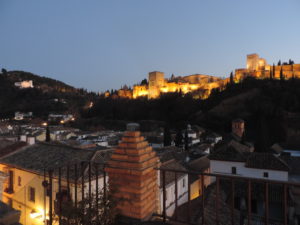
The Alhambra from the old moorish walls of the Albaicin
Malaga’s bus station is the size of Buchanan Street’s in Glasgow and as busy. Their cakes are bus station quality: look nicer than than they taste. The café con lêche however was welcome and my bus departed on time. People seemed to just materialise 10 minutes before departure time and the driver prised open the luggage area as late as he could after checking tickets were correct. I had bought mine online from bus company ALSA in advance to get a choice of ticket price and bus pace, slow, speedy and medium all having different prices. They can be bought in the bus station too if you have no particular schedule.
We speeded up steep passes onto the Granada plain. The vista changed to dusty olive groves, newly sown fields of cereals and reed-filled irrigation ditches. One is reminded that rain is a rare blessing in this landscape and mountain meltwater supplies the rivers in spring, not rain. We are overlooking Morocco this far south.
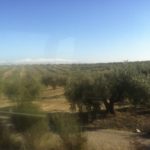
Olives groves on the Alpujerras plain, a camera snap from the bus.
Granada bus station is far from town so I took the recommended bus to the city centre. I got off at the cathedral as directed and wandered the centre square’s Bib Rambla area which has alleyways which resemble Arabic souks. Being afternoon (and nearer the mountains) the temperature was a fair 12C. I found the Tourist information centre nearby who sent me on to an old courtyard where I could collect my Alhambra ticket (bought online already) and save me time next day as well as mean I could go in via a different entrance. It was another 20 minutes’ walk from here to the old town where I was to be based.
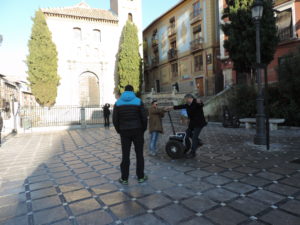
Here’s the latest way to make tourist tours: Segway rides.
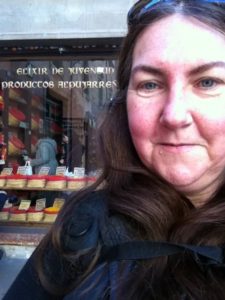
In need of some elixir of youth, I find the right store. Did it work though?
The Alhambra is a series of castles, gardens and palaces built from before the 9th Century to the 16th by moorish rulers and then reformation ruler , on a promontory above the river Darro in Granada. After being used for gun target practice by Napoleon’s troops(!) it was rediscovered as a place of romantic beauty and inspiration in the later 19th C, thanks to the writing of American author Washington Irving and the art of local painter Mariano Fortuny. It is now a massive tourist trap.
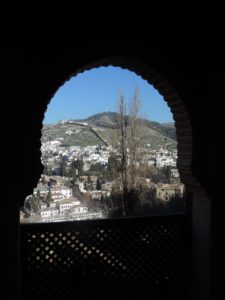
View of the Albaicin from the Nazrib palaces
The nearer you get to the Alhambra, the dearer the shop and cafe prices. 2.5 million visitors go through the Alhambra yearly so going in winter has advantages. Your ticket is for either morning or afternoon, the stated entrance time is your time slot to enter the 13-14C Nasrid palaces. They are worth seeing for their Islamic art, formal water garden engineering and great elegance but you have to stick to your allotted entry.
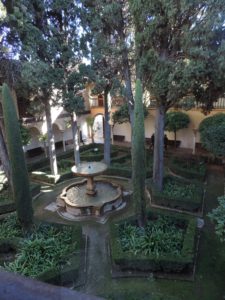
Nazrib Palaces, Court of the Linderaja
In winter it may be possible to sit and sketch or muse there a while, while guided parties overtake you, marching in timed order. I doubt this would be so in summer. There are night time palace visits also if you want to stretch your day. It takes more than 3 hours to begin to view the palaces and museums on site so expect a long tiring day or book a return visit.
My biggest discovery was – and the architecture was great but one can be overwhelmed by so much beauty- how big persimmon trees grow. I will not now be buying one for my polytunnel as their growth habit is clearly very upright and I doubt they would like being constantly pruned to fit my 9 foot available height. Their orange globular fruits, sold as Kakis or Sharon fruits in UK, are beloved of local sparrows and blackbirds and one of the few places wild birds are easily seen here. Hunting and caging songbirds is still common in Spain and these birds know!
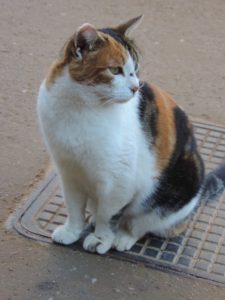
I’m waiting. Where is that cheese you promised me? Yes of course a cat found me!
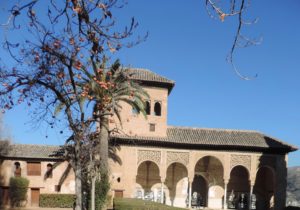
Persimmon tree and royal palm at the Palacio del Partal, really thats much too tall a tree for my polytunnel.
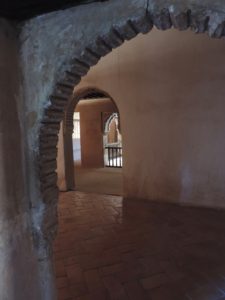
Enticing doorways lead to the bath house
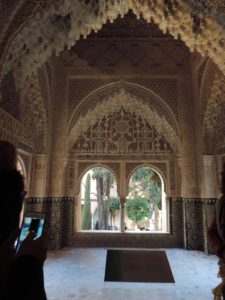
Fabulous plasterwork, tiles and mosaics adorn the Palaces
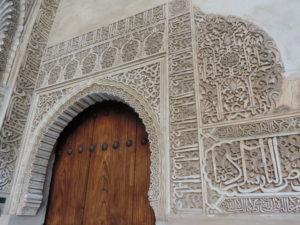
Poetry is written around all the palace walls
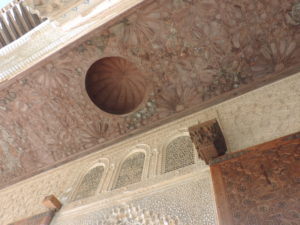
Wood inlay and ceilings, plus ornate plasterwork
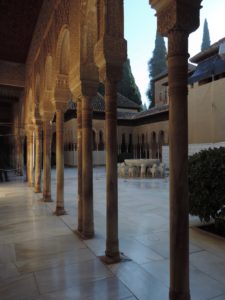
Nazrib palace, court of the lions
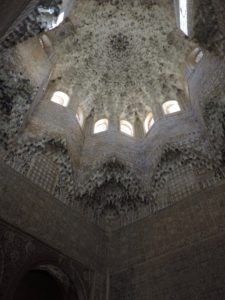
Plasterwork at Nazrib palace, court of the lions
The whole of the Albaicin or old town adjacent the Alhambra is a World Heritage site and the narrow streets are quaint and not wide enough for most cars. A few taxis ply their wares and a mini-sized bus runs regularly about the old town, taking tourists to the squares high, high up the steep slopes surrounded by ancient moorish walls. You can hear the sound of bells calling the faithful to prayer from the many churches which date from 16C onwards. Some, like Santa Ana were conversions from mosques. Each evening the scent of burning oak and olive wood fills the air as stoves are lit.
Sitting out with a beer or sangria or fresh zumos de naranja you will find yourself serenaded by a succession of local acts. These descend on their scooters with flamenco guitar, percussion equipment or Elvis impersonation kit, and play for their supper. if you want to be more discerning, pick a restaurant with (flamenco) entertainment included.
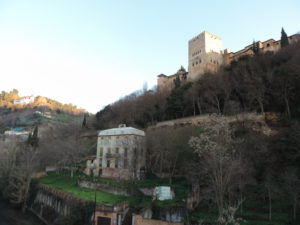
The Alhambra as seen from my apartment
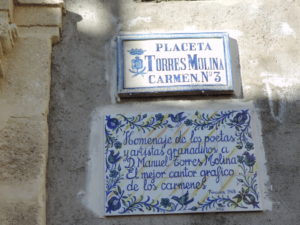
Local poets like Molina and Lorca are honoured in Granada
Being so close to the snow-capped mountains means night temperatures in Granada are colder than those in Scotland. One day the ice on my balcony did not melt at all. Frost sat in pockets in the gardens of the Generalife Palace. I was quite glad to return after 3 days there to the warmth of Malaga and the coast. This city was beginning to feel like home.
I did my best to try all the lower-gluten home-baking in the bakery on Calle Atarazanas, El Colmenero de Alhaurin (such hardship, but how else to tell you about it?).
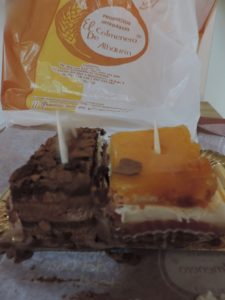
Malaga caramel and chocolate cream cakes
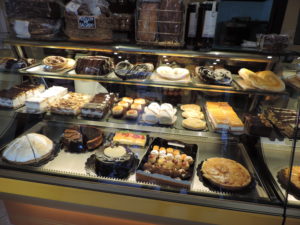
Delicious bakery goods in Malaga
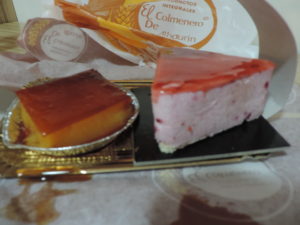
Strawberry cream cakes and egg custard flan
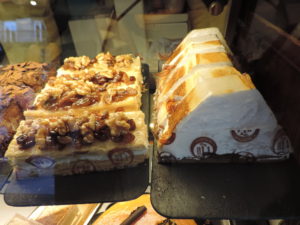
Walnut cakes and meringues
I
I pottered round the folk museum, which was once an old tavern and amongst other things holds crafts, religious items and costumes. I bought new harvest olives in the market and wondered if I would get them through customs. I started to learn Spanish words, bearing in mind Andalusian pronunciation often misses out consonant letters. I found the grand cathedral which is near the posh shops and made plans to visit on another morning. I got quite in the swing of Spanish day timings (avoiding working in the hottest part of the day, relaxing into long evenings) which are so different from ours yet so suit the soul of the artist. I can see why writers like Hemingway came here.
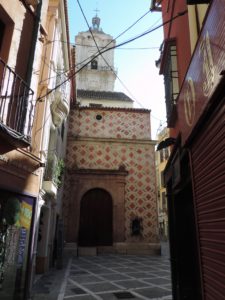
Iglesio St. Juan, old town Malaga
I am looking forward to my own next visit, chance to visit the Centre Pompidou by the port and the other museums and galleries I missed. Next time I go I will have learned more Spanish phrases.
And how did the customs go? As my friend Finola predicted, olives were no problem. However quartz crystals wrapped in socks were very worrying for the airport staff – I had, true to form, found the crystal shop and more gems are still to come home to Scotland from there but thats for another episode.
Useful words/links:
por favor – please
gracias – thank you (pronounced grathia in Andaluz because they lose consonants )
Cero, uno, dos, tres, cuatro, cinco, seis, siete, ocho, nueve, diez etc (learn some numbers and don’t trust my spellings!)
autobus, aeropuerto, el tren – bus, airport, train
la cuenta – bill
https://quizlet.com/14370012/spanish-vocabulary-train-travel-flash-cards/
http://www.fluentu.com/spanish/blog/useful-spanish-travel-phrases-words/
http://granadamap.com
https://www.alhambradegranada.org/en/info/historicalintroduction.asp



